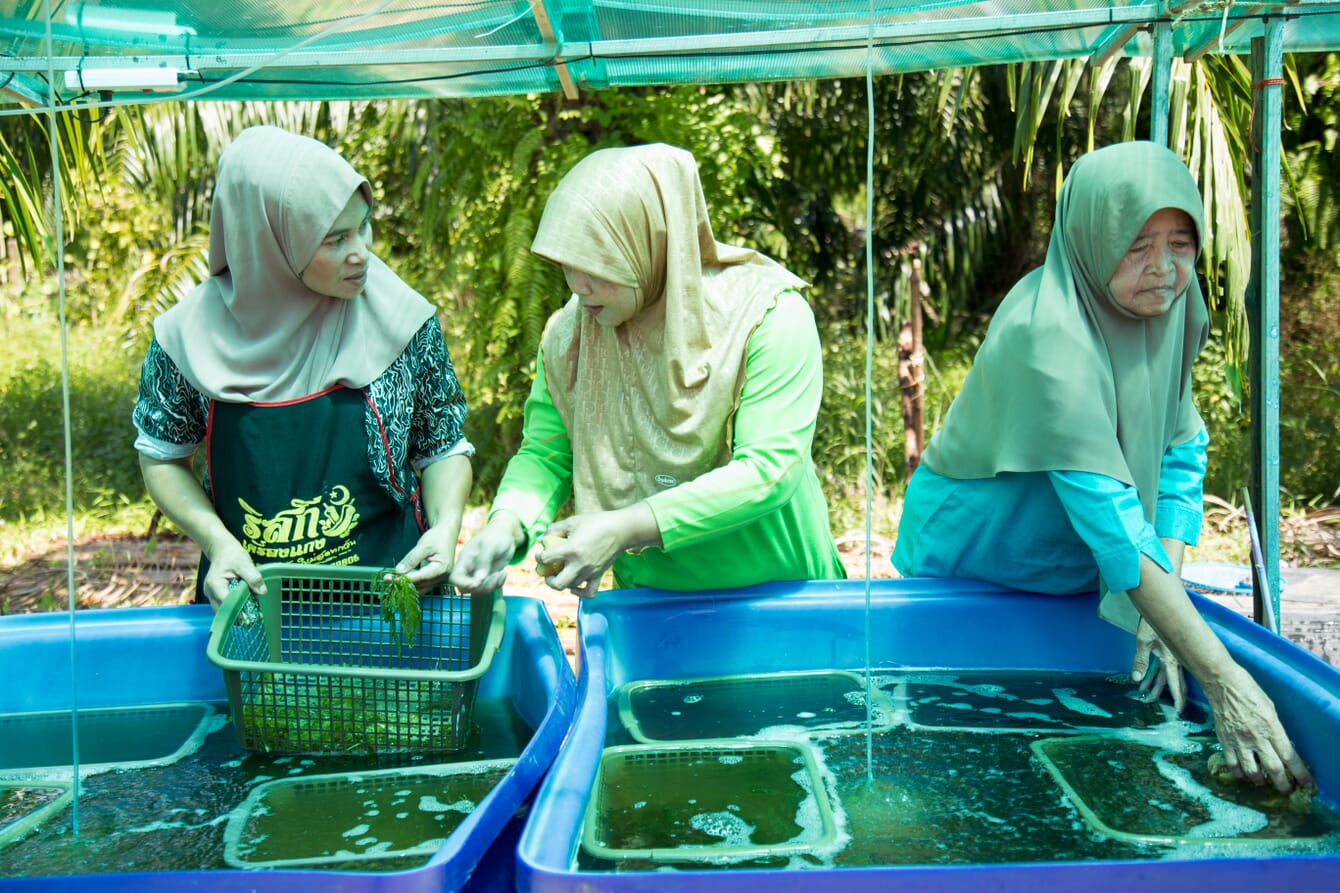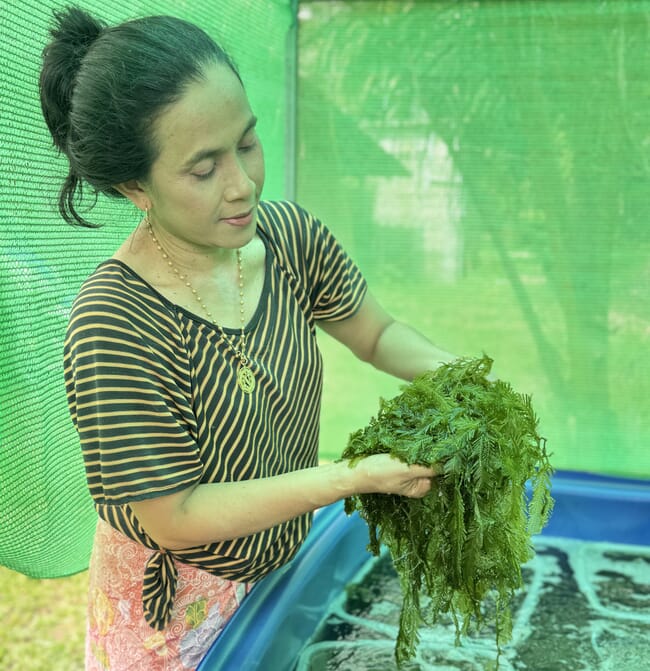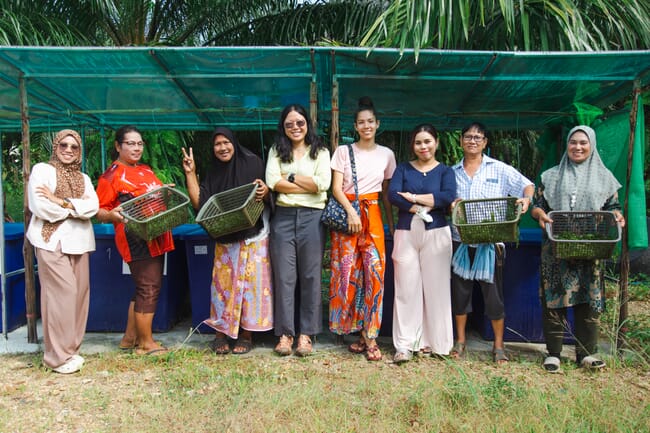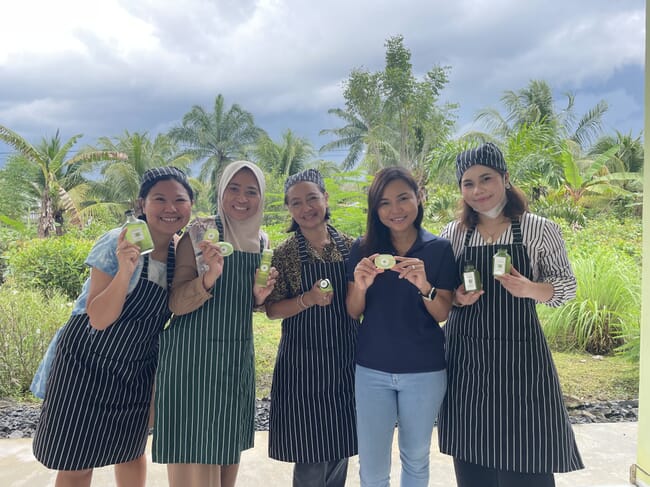
© Yunus Thailand
Despite a high domestic demand for seaweeds, and flourishing algae farming industries in neighbouring countries, Thailand’s seaweed aquaculture sector is surprisingly underdeveloped.
This was one of the first thoughts of Callum Mackenzie, managing director of Yunus Thailand, as he travelled through the country by motorcycle on the hunt for seaweed farms.
Whilst his journey yielded little in the way of seaweed, Mackenzie did make some fruitful connections with Thailand-based academics and, together with Nobel Peace Laureate Mohammad Yunus, they conceived a research project to develop a simple kit which could enable anybody to become a seaweed entrepreneur, which they presented to the Global Seaweed Coalition.
Now, three years on from the conception of Yunus Thailand’s Seaweed Social Business project, and with a pilot cohort of seaweed entrepreneurs growing and selling their own produce, Mackenzie reflects back on the ethos behind the project.
“At Yunus Thailand, we want to create a world of three zeros: zero net carbon emissions, zero unemployment, and zero poverty. In terms of how we do this, we engage people in social business and provide support to our entrepreneurs as they develop and grow. We work across different topics and themes, but we have become very interested in seaweed as it aligns perfectly with our values. On the one hand there are lots of environmental benefits to farming seaweed, and on the other it has excellent income generating potential for low-income communities,” he explains.
“The other interesting aspect, from our perspective, is that the value chain is really undeveloped because the industry is relatively new, so it’s an exciting opportunity to think how capitalism can be done differently, moulding the value chain form the very beginning.”

© Yunus Thailand
Social change through seaweed
Having realised the potential of seaweed farming and entrepreneurship to create social change, Yunus Thailand’s Seaweed Social Business team set about developing a kit that would enable anybody to farm Caulerpa – a genus of seaweed native to Thailand - in their garden.
The kits consist of a land-based system of two tanks wrapped in sheeting to maintain temperature and keep out rain, all covered with a tinted roof which lets in solar energy for photosynthesis whilst blocking heat.
The simplicity of the growing kit is no accident, but serves to keep costs low, and repairs or replacements easy to acquire.
“These kits allow people to cultivate seaweed year-round in a climate-friendly way, and it’s really simple. It takes around 5 – 10 minutes of work per day, and you don’t need a boat or any specialised equipment. This means the costs are relatively low. One kit costs about £200. If you’re successful, this can be made back in about 4 months,” explains Mackenzie.
“We designed it in this way as it allows entrepreneurs to start a business in a low-risk way. They can start with one kit and learn how to cultivate seaweed, and how to sell it, and then they can add more. One person could easily manage up to 20 kits,” he adds.
With the technology designed, it was time to put it to the test. To achieve this, Yunus devised a pilot of 50 women-entrepreneurs from some of the most low-income households in Satun Province, none of whom had farmed or sold seaweed before, and many of whom could not read or write. Despite this, after some basic training, all participants were able to successfully cultivate Caulerpa.

© Yunus Thailand
Mackenzie admits to some initial worries over the diligence needed to look after the seaweed properly but, much to his amazement, many of the entrepreneurs became so attached to their Caulerpa crop that they initially refused to harvest and sell it, instead viewing it as a pet to be looked after.
“We had to foster a bit of a behaviour change, which is still a process that is ongoing, but now I can happily say that everyone is now selling their seaweed,” Mackenzie says.
The third stage of the project, which is still ongoing, involves the development of a social business middleman, which can purchase seaweed from the entrepreneurs to ensure that they have a stable income stream. Mackenzie highlights that this wouldn’t mean purchasing the entirety of the entrepreneurs’ seaweed stock, but around 50 percent, which could be sold on to processors or developed into value-added products - such as a seaweed sports drink, currently in development – with the profits from this being reinvested into the project to help with scaling up.
Scaling up of the Seaweed Social Business project can occur in two ways, either internally – with current participants increasing the size of their operation by buying more kits – or externally through the recruitment of new entrepreneurs.
Funded by grants from the Global Seaweed Coalition; the Canada Fund for Local Initiatives; and the Foreign, Commonwealth and Development Office of the UK, the seaweed growing kits, along with the training provided by Yunus Thailand’s Seaweed Social Business Team, are currently free for the 50 participants of the pilot project. However, in order to enact the third phase and up the scale of the project, Mackenzie notes that they may be look to impact-investors for support.

© Yunus Thailand
Community impacts
That Yunus Thailand has decided to engage exclusively with low-income women for the project, at least initially, has no doubt had a positive impact on the women themselves, with the Seaweed Social Business team relaying that many have noticed an increased sense of self confidence and worth following their success growing and selling their own produce. In the villages where Yunus Thailand is operating the programme, which tend to be fairly conservative, this will no doubt create profound, if subtle changes to the traditional gender roles and power dynamics that can be found in these communities.
“Our work can help to improve women’s self-perception and confidence, along with nurturing their independence. This is something we see first-hand, and something I take a lot of pride in, although there is still much more to do,” he reflects.
The rollout of the pilot project has also impacted the perception of climate change and environmental pollution within the communities due to the stark difference between the tasty, nutritious Caulerpa grown by the entrepreneurs and the wild-harvested seaweed which often results in illness. This shows the communities the effects of a clean environment compared to a polluted one, says Mackenzie, and by continued education – Yunus Thailand is planning to establish a seaweed kit within a school – they hope to support this mind-shift change.
Whilst Mackenzie is hesitant to quantify his aspirations for the project’s development, the apparent success of the pilot scheme bodes well for the future of the Seaweed Social Business project.
“I wouldn’t want to put numbers on it, but I would like it to be a strong and commercially viable social business which has the ability to empower communities at scale, and which influences people to copy and develop social businesses, both with seaweed and beyond,” he concludes.
And, considering the local belief that Caulerpa brings good fortune, it seems that the future is indeed bright for Yunus Thailand’s seaweed project.




